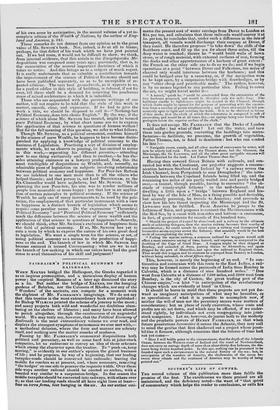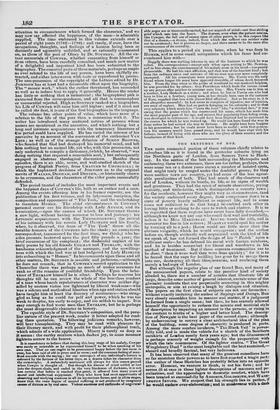SOUTHEY'S LIFE OF COWPER.
THE second volume of this publication more than fulfils the promise of the first. The excellencies we there praised are all maintained, and the deficiency noted—the want of "that spirit of commentary which helps the reader to conclusions, or calls his attention to circumstances which formed the character," and we may now say affected the happiness, of the man—is admirably supplied. The time embraced in this volume extends over a period of eight years 0782-1790): and rarely, if ever, have the occupations, thoughts, and feelings of a human being been so distinctly and agreeably unfolded, and so rationally commented on, as those of the poet of Olney by Dr. SOUTHEY. All the ex- tant memorials of COWPER, whether emanating from himself or from others, have been carefully consulted, and much new matter of a delightful and important kind has been submitted to the biographer. The essent ial parts of these materials, perhaps as ample as ever related to the life of any person, have been skilfully ex- tracted, and either interwoven with taste or reproduced by genius. The non-possession of the copyright of the Letters edited by Dr. Jooresces has at least had a favourable effect upon the biography. The" mosaic work," which the author threatened, has succeeded so well as to induce him to apply it generally. Hence the reader has little or nothing that is immaterial ; the biographical pith is extracted from the correspondence, and all that is commonplace or unessential rejected. High as SOUTH KY ranked as a biographer, his Life of Coweea will raise him still higher ; and if it must not be called the first, it is one of the first biographies in the language.
The volume has other points of value, which have more of a relation to the life of the poet than a connexion with it. The writer has introduced many scattered notices of persons whose names are mentioned in the narrative, and which nothing but a long and intimate acquaintance with the temporary literature of the period could have supplied. He has varied the interest of his narrative by an account of the conversion of the enthusiast VAN LZER; as well as of the strange delusion of SIMON Baowes, who fancied that God had destroyed his immortal mind, and left him nothing but an animal life, yet who, with this persuasion, not only undertook to compile a dictionary, (which, he observed," was doing nothing that required a reasonable soul,") but subsequently
engaged in abstruse theological discussions. Besides these episodes, there is an able, acute, and well-studied sketch of the progress of English Poetry, from CHAUCER to CHURCHILL; in which the haphazard decisions of JOHNSON as to the original merits of WALLER, DENH AM, and Devnee„.re historically shown to be erroneous, and the characters of the elder poets successfully .defended.
The period treated of includes the most important events and the happiest days of COWPER'S life, both as an author and a man. Among the events affecting him in his former capacity, are the publication of his first volume, and its lukewarm reception, the composition and appearance of "The Task," and the undertaking to translate HOMER. The chief circumstances in COWPER'S personal career are his friendship with Lady AUSTEN, and its termination,—upon the causes of which Dr. SOUTHEY throws a new light, without having recourse to love and jealousy ; his fortunate acquaintance with the THROGMORTONS ; the revival of his intimacy with his cousin Lady l'esiceeit and his family,. when, be it observed, the fame of "The Task" threw all the heraldic honours of the COWPERS into the shade; an anonymous correspondent, (announced for the first time, we think,) who be- sides presents bestowed upon the poet fifty pounds a year; the brief recurrence of his complaint; the disdainful neglect of his -early poems by his old friends Colmar.; and THURLOW, with the handsome acknowledgment of the manager, and the unwilling- ness with which the lord was at last badgered by Lady HESKETH into subscribing to "Homer." In his comments upon these and all other matters, Dr. SOUTHEY is sensible and judicious,—although he does not remark, that in COWPER'S second application to the Chancellor there was perhaps as much of undue reverence for rank as of the remains of youthful friendship. Upon the beha- viour of THURLOW himself he is silent. Perhaps he reserves his thoughts till he can review the whole of the heartless conduct of a wan whose harsh repulsiveness of character was neither dig- nified by austere virtue nor lightened by liberal weakness—who was a solemn and methodical libertine when age and station should have taught him at least the decency of continence—who strug- gled as long as he could for pelf and power, which he was too weak to despise, too surly to enjoy, and too selfish to impart. It is easy enough to find worse men than THURLOW, but he is perhaps the most disagreeable character in history. The equable style of Dr. Souniev's composition, and the pecu- liar nature of the present work, render it better adapted for read- ing than quotation. The following judicious remarks, however, will bear transplanting. They may be read with pleasure for their literary merit, and with profit for their philosophical truth, which admits of a wide application. Misery is rarely so deep as it seems: the earthy mixture which dashes joy, in some measure lightens sorrow to the bearer.
It is consolatory to believe that during this long stage of his malady, Cowper one rarely so miserable as he represented himself to be when speaking of his own caw. That no one ought to be pronounced happy before the last scene is over, has been said of old in prose and in verse; and the common feeling of man- kind accords with the saying ; for our retrospect of any individual's history is coloured by the fortune of his latter days, as a drama takes its character from the catastrophe. A melancholy sentiment will always for this reason prevail when Cowper is thought of. But though his disease of mind settled at last into the deepest shade, and ended in the very blackness of darkness, it is not less certain that before it reached that paint, it allowed him many years of moral and intellectual enjoyment. They who have had most opportunity of observing and studying madness in all its mysterious forms, and in aline stages, know that the same degree of mental suffering is not produced by imaginary
comes of distress as by real ones. Violent emotions end outbreaks of eagoveras
able anger are at timet easily excited, but not anguish of mind—not that abiding grief which eats into the heart. The distress, even when the patient retains, like Cowper, the full use of reason upon all other points, is in this respect like that of a dream,—a dream, indeed, from which the sufferer can neither wake nor be awakened ; but it pierces no deeper, and there seems to be the same dim consciousness of its unreality.
This applies to a period six years later, when he was deep in }Immo, and in some small occupations which his fame bad en- cumbered him with— Happily there was nothing irksome in any of the business to which he was called. His correspondence—except only when upon writing to Mr. Newton, and to him alone, the consciousness of his malady arose in his mind—was purely pleasurable. He had his own affliction, and that was of the heaviest kind but from the ordinary cares and sorrows of life no man was ever more completely exempted. All his connexions were prosperous. Mr. Cowin was the only friend whose longer life must have appeared desirable, of whom death bereaved him. From the time when in the prime of manhood he was rendered helpless, he was provided for by others: that Providence which feeds the ravens raised up one person after another to minister unto him. Mrs. Unwia was to him as a mother, Lady Hesketh as a sister ; and when he lost in Unwin one who had been to him as a brother, young men, as has already been seen in the instance of Rose, supplied that loss with almost filial affection. Sad as his story is, it is not altogether mournful : he had never to complain of injustice, nor of injuries, nor even of neglect. Man had no part in bringing on his calamity; and to that very calamity which made him "leave the herd" like:" a stricken deer," it was owing that the genius which has consecrated his name, which has made him the most popular poet of his age, and secures that popularity from fading away, was developed in retirement : it would have been blighted had he continued in the course for which he was trained up. He would not have found the way to fame unless he had missed the way to fortune. He might have been happier in his generation; but he could never have been so useful : with that genera- tion his memory would have passed away, and he would have slept with his fathers, instead of living with those who are the glory of their country and the benefactors of their kind.



























 Previous page
Previous page